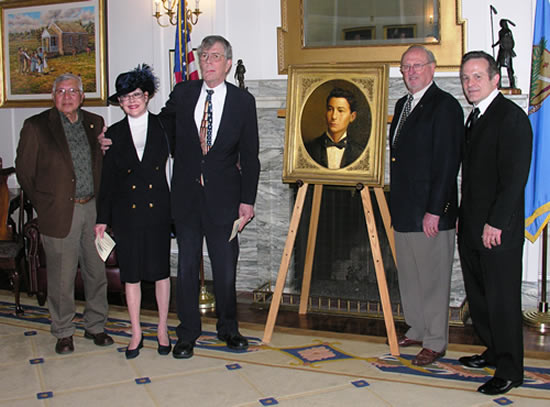In order to provide equal access and equal opportunity to people with diverse abilities, this site has been designed with accessibility in mind. Click here to view
Portrait of Creek Journalist and Poet Laureate Alexander Posey Dedicated in Senate
 The sponsors of the Alexander Posey portrait Speaker Thomas Yahola, representing the Muskogee Nation National Council, and former state Senator Jim and Sally Howe Smith pose wtih Senate Preservation Fund president and former Senator Charles Ford and arti
The sponsors of the Alexander Posey portrait Speaker Thomas Yahola, representing the Muskogee Nation National Council, and former state Senator Jim and Sally Howe Smith pose wtih Senate Preservation Fund president and former Senator Charles Ford and arti
The state Senate dedicated a portrait Monday of Creek journalist and Poet Laureate Alexander Posey. The piece was commissioned by the Oklahoma State Senate Historical Preservation Fund, and was sponsored by the Muskogee Creek National Council and the family of former Senator Jerry Smith.
“It’s an honor to be at the state Capitol and to be a part of this program and the tribute that the state is making to one of our citizens," said Thomas Yahola, Speaker of the Muskogee Nation National Council.
Smith’s wife Sally Howe Smith is a distant relative of Posey, which is why the family wanted Posey’s story to be shared with others.
“I know that for everyone that is a part of Alexander Posey's life, whether a relative or not, this day is long overdue and we're truly overjoyed that he'll be recognized in the state Capitol," said Smith.
Posey is best known for his insights into Creek Indian tribal politics and Native American customs which he recorded in his poetry, journalism and political satire. He lived through a crucial period in the history of the Creek Nation, when the tribe’s land base and political autonomy were threatened by assimilation to Euro-American culture.
“This is a wonderful opportunity to bring forth a very famous Oklahoma Creek Indian that the younger generation hasn’t had the privilege to know. Alexander Posey was a young man who knew what he wanted out of life and went after it. He wasn’t afraid and didn’t let his age or anything else hold him back from following his dreams and attaining greatness,” said Charles Ford, president of the preservation fund. “He is an example to all of us of what is possible with hard work and determination. We’ve been wanting to do his portrait for several years and I’m glad that it’s finally finished and ready for the world to see.”
Posey was born into a bicultural and bilingual family. His mother was Creek Indian and his father had Scottish ancestry but had grown up in the Creek community.
After leaving Bacone Indian University in Muskogee in 1895, Posey was elected to the lower chamber of the Creek National Council and embarked on a long career of public service, including serving as administrator to tribal schools as well as Secretary of the Sequoyah Convention.
In 1902, he also began a career as a journalist, establishing he Eufaula Indian Journal, the first daily newspaper published by a Native American. As editor of the paper, he is best known for his works called the Fus Fixico letters. Narrated by a Creek character named Fus Fixico (which translates as either “Warrior Bird” or “Heartless Bird”), the letters offered humorous political and cultural commentary written from the perspective and in the dialect of Indian speakers. The Fus Fixico letters did not always correspond to Posey’s own convictions, but offered variety of perspectives on the difficult issues facing the Creeks in his time.
Tragically, Posey died before he was able to completely fulfill the promise of his innovative writing. He drowned at age 35 when his boat capsized on the North Canadian River.
Like many others in the state Capitol, the portrait was painted by Norman artist Mike Wimmer.
“It’s always an honor to be asked to do these historical pieces, but this one was particularly special because it’s rare to have the opportunity to honor another artist,” said Wimmer. “One thing that I was so impressed by about Posey was that he didn’t wait until he was older to follow his dreams. He gave all he had from the beginning, and it’s evident in his wonderful works.”
This and other art commissioned by the Oklahoma State Senate Historical Preservation Fund, Inc. can be found on the Internet at www.oksenate.gov under “Senate Artwork”.
 Oklahoma Senate
Oklahoma Senate

